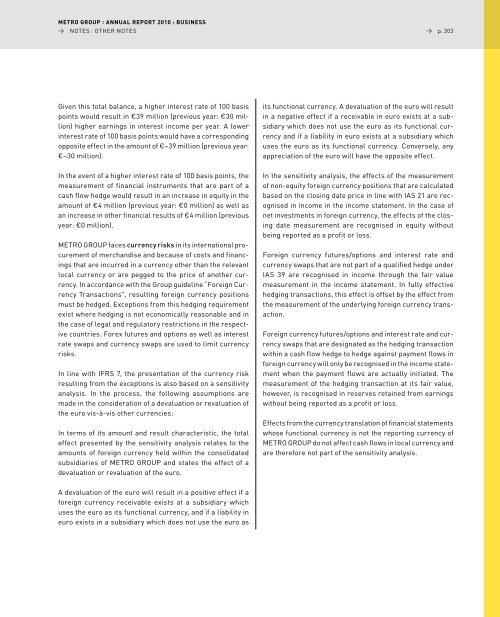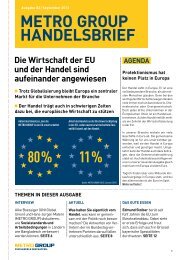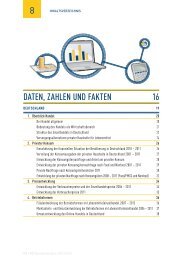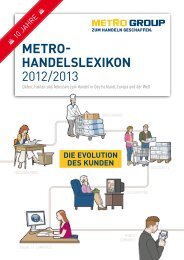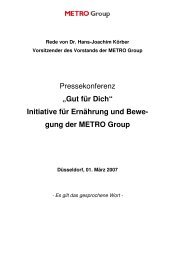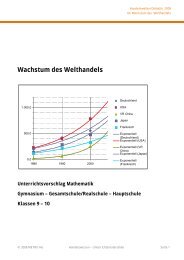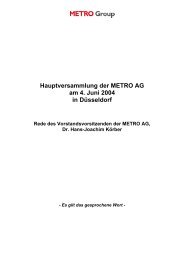pdf (2.5 MB) - METRO Group
pdf (2.5 MB) - METRO Group
pdf (2.5 MB) - METRO Group
Create successful ePaper yourself
Turn your PDF publications into a flip-book with our unique Google optimized e-Paper software.
<strong>METRO</strong> GROUP : ANNUAL REPORT 2010 : BUSINESS<br />
→ NOTES : OThER NOTES<br />
Given this total balance, a higher interest rate of 100 basis<br />
points would result in €39 million (previous year: €30 million)<br />
higher earnings in interest income per year. A lower<br />
interest rate of 100 basis points would have a corresponding<br />
opposite effect in the amount of €–39 million (previous year:<br />
€–30 million).<br />
In the event of a higher interest rate of 100 basis points, the<br />
measurement of financial instruments that are part of a<br />
cash flow hedge would result in an increase in equity in the<br />
amount of €4 million (previous year: €0 million) as well as<br />
an increase in other financial results of €4 million (previous<br />
year: €0 million).<br />
<strong>METRO</strong> GROuP faces currency risks in its international procurement<br />
of merchandise and because of costs and financings<br />
that are incurred in a currency other than the relevant<br />
local currency or are pegged to the price of another currency.<br />
In accordance with the <strong>Group</strong> guideline “foreign Currency<br />
Transactions”, resulting foreign currency positions<br />
must be hedged. Exceptions from this hedging requirement<br />
exist where hedging is not economically reasonable and in<br />
the case of legal and regulatory restrictions in the respective<br />
countries. forex futures and options as well as interest<br />
rate swaps and currency swaps are used to limit currency<br />
risks.<br />
In line with IfRS 7, the presentation of the currency risk<br />
resulting from the exceptions is also based on a sensitivity<br />
analysis. In the process, the following assumptions are<br />
made in the consideration of a devaluation or revaluation of<br />
the euro vis-à-vis other currencies:<br />
In terms of its amount and result characteristic, the total<br />
effect presented by the sensitivity analysis relates to the<br />
amounts of foreign currency held within the consolidated<br />
subsidiaries of <strong>METRO</strong> GROuP and states the effect of a<br />
devaluation or revaluation of the euro.<br />
A devaluation of the euro will result in a positive effect if a<br />
foreign currency receivable exists at a subsidiary which<br />
uses the euro as its functional currency, and if a liability in<br />
euro exists in a subsidiary which does not use the euro as<br />
→ p. 203<br />
its functional currency. A devaluation of the euro will result<br />
in a negative effect if a receivable in euro exists at a subsidiary<br />
which does not use the euro as its functional currency<br />
and if a liability in euro exists at a subsidiary which<br />
uses the euro as its functional currency. Conversely, any<br />
appreciation of the euro will have the opposite effect.<br />
In the sensitivity analysis, the effects of the measurement<br />
of non-equity foreign currency positions that are calculated<br />
based on the closing date price in line with IAS 21 are recognised<br />
in income in the income statement. In the case of<br />
net investments in foreign currency, the effects of the closing<br />
date measurement are recognised in equity without<br />
being reported as a profit or loss.<br />
foreign currency futures/options and interest rate and<br />
currency swaps that are not part of a qualified hedge under<br />
IAS 39 are recognised in income through the fair value<br />
measurement in the income statement. In fully effective<br />
hedging transactions, this effect is offset by the effect from<br />
the measurement of the underlying foreign currency transaction.<br />
foreign currency futures/options and interest rate and currency<br />
swaps that are designated as the hedging transaction<br />
within a cash flow hedge to hedge against payment flows in<br />
foreign currency will only be recognised in the income statement<br />
when the payment flows are actually initiated. The<br />
measurement of the hedging transaction at its fair value,<br />
however, is recognised in reserves retained from earnings<br />
without being reported as a profit or loss.<br />
Effects from the currency translation of financial statements<br />
whose functional currency is not the reporting currency of<br />
<strong>METRO</strong> GROuP do not affect cash flows in local currency and<br />
are therefore not part of the sensitivity analysis.


